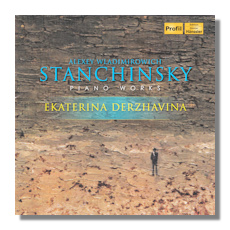
The Internet's Premier Classical Music Source
Related Links
-
Stanchinsky Reviews
- Latest Reviews
- More Reviews
-
By Composer
-
Collections
DVD & Blu-ray
Books
Concert Reviews
Articles/Interviews
Software
Audio
Search Amazon
Recommended Links
Site News
 CD Review
CD Review
Alexei Vladimirovich Stanchinsky

Piano Works
- 12 Sketches, Op. 1
- Five Preludes
- Three Preludes
- Prelude in E-Flat Major in Lydian Mode
- Prelude in B Major in Mixolydian Mode
- Sonata #1 in F Major
- Lieder ohne Wörter
Ekaterina Derzhavina, piano
Profil PH17003
Alexei Vladimirovich Stanchinsky lived from 1888 to 1914. He belongs in the company of those composers, the shortness of whose lives has probably deprived us of a wealth of imaginative and ingenious music. Although he died at only 26, after an attempt to cross a river in order to… "become one with eternity", Stanchinsky was admired by Tanayev (with whom he studied), Scriabin and Tolstoy. He was also deeply religious; and apparently unable to deal successfully with (mental) health challenges, or with the excitement generated by musicians (and indeed the reception of his compositions) in the hothouse of early twentieth century Russia.
Ekaterina Derzhavina writes persuasively in her notes on Stanchinsky which accompany this CD to suggest that Stanchinsky's emotional intensity and use of counterpoint defined his status and contribution to Russian music of the period. And Derzhavina (born 1967) makes a good case to support that same view in her actual playing. She includes four (sets of) works. The Songs without Words were written when Stanchinsky was only 15. The ten "Preludes" comprise four groups, all but one composed by 1910. The First Sonata was completed in 1911. The Twelve Sketches were published in 1914 and, as Opus 1, can actually be considered his first mature work.
Interestingly, Derzhavina performs these in reverse chronological order - perhaps as an act of faith to show how durable she believes the appeal of the composer to be. One detects elements of Liszt, Chopin, Scriabin and Mussorgsky (in the pensive C# minor Prelude [tr.17], for instance). Although the music is full of emotion, its pacing and tonalities are romantic. Stanchinsky has a penchant for circling around a melodic idea with concealed determination; then the music centers in on a resolution. This rarely lacks rigor; nor or is it repetitive.
What's more, Derzhavina's playing is tight, purposeful, focused and technically adept. At the same time, she honors the composer's sense of wonder, sadness, reflection and heightened emotions throughout. Again, this sense of depth can perhaps best be heard in the Preludes… the lovely, meandering, thoughtful E flat minor [tr.21], for example. It's played languorously and pensively without a hint of aimlessness.
Typical of the way in which this CD has been conceived and executed is the next Prelude ([tr.27] in B flat minor). And indeed the angular and acerbic Sonata in F [tr.s 23,24,25]. They are punchy (without being hammered or over rhetorical), snappy and trenchantly played, as though the pianist were taking her directions from the composer smiling at her shoulder.
The recordings were apparently made in 2004 and 2005 and released only last year (2017). They can be praised for their lack of superfluous or spurious embellishments while scooping out all of Stanchinsky's expression, emotion and communicativeness. Of positive note, in particular, is the way in which Derzhavina's approach completely sidesteps any temptation to add elements in the writing which are not there in order to make it fit our preconceptions of what early twentieth century Russian piano music should sound like when we think of others writing at the time. Yes, Stanchinsky is very much his own person. And Derzhavina makes a fine advocate by exposing us to what is there and making otherwise unfamiliar music pleasing and enticing.
Equally satisfying is the pianist's sensitivity to music that is itself often tender and restrained. The gentle walk (neither stroll nor jog) through the enveloping worlds created in the Lieder ohne Wörter – particularly the lovely largo [tr.26] is remarkable because it blends purpose with subtlety very well. It seems as though the music could be made to sound no other way. The progression through scarcely-syncopated phrases is articulated as delicately and with a lightness of touch that seems to pause in time before the calmness of Stanchinsky's resolution returns us to the filigree material of a deceptively simple melody. Derzhavina's is exemplary playing which avoids the saccharin by steering a firm path between coarseness nor indulgence by a convinced advocate of undeservedly overlooked writing.
The acoustic (the recording location is not referenced in the CD's well-written and informative booklet) has just the right amount of resonance to pull out the nuances of this subtle and pleasing music. Apart from the inclusion of the Sketches, also played by Derzhavina [on Danacord 679], there appear to be no recordings of any of Stanchinsky's music in the current catalog. This intelligent, technically convincing and perceptive set of accounts by a pianist admirably suited to the idiom is recommended.
Copyright © 2018, Mark Sealey


















